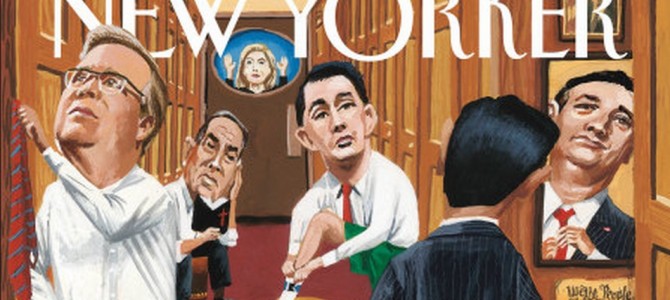
What does it take for The New Yorker to start sounding like Robert Bork and Bill Bennett in the 1990s? Apparently, the election of Donald J. Trump. Many on the Left are now preaching moralistic sermons about the decline of our culture and media, issuing stern warnings about the perils of democracy citing Plato and Tocqueville, and praising the American founders’ warnings about demagoguery.
Alex Ross’s “The Frankfurt School Knew Trump Was Coming,” published by The New Yorker on Monday, is a fine example of this rhetorical about-face. There is no provincialism worse than Manhattanite provincialism, of which the New Yorker is the flagship journal, and thus an all too easy target when it solemnly intones its oracular wisdom within the coastal echo chambers of trust.
Theodor Adorno, Max Horkheimer, and others in the Frankfurt School of Marxists who came to America fleeing Nazi persecution are, to be sure, sometimes penetrating, always fascinating, and certainly influential on the subject of media, technology, and western culture. Some, like my ornery friend Michael Walsh, do not find them entirely salutary. But while Ross may be a fine writer on music, he should have stuck to it:
[Theodor] Adorno believed that the greatest danger to American democracy lay in the mass-culture apparatus of film, radio, and television. Indeed, in his view, this apparatus operates in dictatorial fashion even when no dictatorship is in place: it enforces conformity, quiets dissent, mutes thought….Watching wartime newsreels, Adorno concluded that the ‘culture industry,’ as he and [Max] Horkheimer called it, was replicating fascist methods of mass hypnosis.
And who controls the “culture industry” in America today, pray tell? I’ll take “the cultural left” for $1,000, Alex. But let’s skip to another two sentences in the very same article:
The failure of Facebook to halt the proliferation of fake news during the campaign season should have surprised no one; the local hirelings of logic are too enamored of their algorithms—and of the revenue they generate—to intervene. From the start, Silicon Valley monopolies have taken a hands-off, ideologically vacant attitude toward the upwelling of ugliness on the Internet.
Yes, yes. Those greedy, ideologically vacant, monopolistic monoliths should begin to comb through all the news in all the world and decide what is real and what is fake, what is true and what is false. Then from this determination they ought to dictate to the unwashed masses what they should and shouldn’t see. The tech industry should be more hands-on and ideologically full, like the rest of the culture industry, enforcing conformity and quiet dissent. That wouldn’t be, er, dictatorial at all.
If I didn’t take his rather touching moral earnestness seriously, I’d think Ross were telling the techie nouveau riche to get with the culture industry’s established authoritarian program. Those upstart Silicon Valley tech companies who are so greedy and care nothing for the common good! Of course, there is nothing remotely similar to them within that well-known bastion of moderation and altruism that is New York City. What’s the name of that one street? There’s something about a wall…
I Thought Truth Was a Power Narrative Wielded By Fascists
Speaking of truth itself, the author cites Frankfurt Schooler Adorno himself: “The conversion of all questions of truth into questions of power, a process that truth itself cannot escape if it is not to be annihilated by power, not only suppresses truth as in earlier despotic orders, but has attacked the very heart of the distinction between true and false, which the hirelings of logic were in any case diligently working to abolish.”
I can’t tell—am I reading First Things? The culture section of National Review? The New Criterion? The Claremont Review of Books? A Thomas Aquinas College graduate? Whatever happened to decades of academia and certain publications on the Left treating all questions of truth and falsehood as questions of power?
Truth? How old fashioned! What is truth, oh fundamentalist New Yorker? Like Pilate before me, I ask you: What. Is. Truth. . .
Was it the Right or the Left in my past life which ceaselessly decried absolutism, and calling for nuance and qualification regarding simplistic, black and white accounts of truth and falsehood? Is this whiplash I’m feeling, or full-on decapitation?
Logic? Didn’t that cease to be a required class at elite schools, like, more than a century and a half ago? All students are required to study logic and rhetoric, much like James Madison did, at my fledgling Catholic university, of course, but who formally studies such things in elite secular education these days unless it be symbolically in a mostly meaningless philosophy elective?
Ah, Now We Love Truth. Your Truth, Or Mine?
But back to Ross, in high moral dudgeon, as they say: “Traditional media outlets exhibited the same value-free mentality, pumping out Trump stories and airing his rallies because they got hits and high ratings.”
Ah, yes: the “value-free mentality.” As we all know, The New Yorker has stood firmly against the “value-free mentality” throughout its history. Media should operate according to a rigorous understanding not only of truth and falsehood but also of virtue and vice, rejecting the Nietzschean transvaluation of values. This is why, for almost a century, The New Yorker has continuously defended an understanding of what is good and what is evil according to reason and revelation in the tradition of the West, exploring the overlap and tension between the two while eschewing the corruptive moral relativism of the late-modern world. Quite.
Ross again: “Nazi Germany was merely the most extreme case of a late-capitalist condition in which people surrender real intellectual freedom in favor of a sham paradise of personal liberation and comfort.”
New Yorker writers, you see, have cleverly disguised the fact that they have been on the side of Plato and Tocqueville all along. It’s almost as if they haven’t advocated for anything but personal liberation and hedonistic comfort every chance they’ve had for almost a century. It’s almost as if they don’t want you to surrender your intellectual freedom to our ideologically vacant and greedy monopolistic tech overlords.
We Hate Pop Culture—When It Works Against Us
Ross continues: “Above all, he [Adorno] saw a blurring of the line between reality and fiction… Now a businessman turned reality-show star has been elected President. Like it or not, Trump is as much a pop-culture phenomenon as he is a political one.” Publications owned by Condé Nast, famous for spinning About Town, and founded with high-end humor in mind would never blur such lines, of course.
Has Ross read Andrew Marantz’s article in his own publication, entitled, “Kanye West for President”? The one where Marantz ends by saying “If I were a Presidential candidate I would be jealous of Kanye’s knack for making the average American feel things”? Yeah. Probably not going to find much more of that kind of thing in the New Yorker after Kanye’s kinda, sorta pro-Trump outburst. I forget—was Kanye the only pop star who didn’t hold a concert for Hillary Goldman Sachs Clinton, or were there a few others?
All of the above is no doubt in stark contrast to President Obama, who, as we all know, has nothing to do with pop culture phenomena. What was that recent Washington Post headline? Ah, yes: “Obama dropped the mic. And made the pop culture world see politics as cool.” But I’m sure President Obama has been talking to the titans of the culture industry directly for more than two years, carefully preparing his image and therefore his power among the people when he transitions out of office, all for the sake of the public good.
But then, in his final line, Ross outdoes himself: “The fear is that the present antidemocratic wave may prove too strong even for Germany—the only country in the history of the world that ever learned from its mistakes.” This is an asinine and, frankly, embarrassing final line that shouldn’t have been tolerated by an editor and doesn’t deserve refutation.
But I would note another contradiction: the present “wave,” my sophisticated friends, is nothing if not democratic. (Might I suggest those who went to exclusive schools read more of the “great books,” since it is obvious most of you have not read enough of them?)
We’re All Authoritarians Now
The irony is that throughout his piece, Ross approvingly references “The Authoritarian Personality,” published in 1950, a product of the Frankfort school authored by Adorno and others. The nasty if not fascinating King Daddy of all modern sociological pseudo-science claimed that America outside of enlightened enclaves like Manhattan was chock full of potential fascists, and working- and middle-class families in the equivalent of today’s red America—and most especially their overbearing fathers—were, of course, to blame. The implication was that America might soon turn into its own version of Nazi Germany. Now, finally, Ross is trying to say, 66 years later, Adorno and friends have been proven right!
Given that today’s working-class whites who voted for Trump have all suffered from the general societal breakdown of the family, and are less likely to have had experienced having a father at all than the enlightened folks who work at I New Yorker, one doesn’t hear this sort of sophistry much anymore. And I’m not the only one having a hard time understanding how all the working-class whites who went from voting for the first black president twice to voting for Trump became politically active racists in eight years.
But what if the authoritarian personalities of those impoverished and suffering white working-class folks without jobs in the Rust Belt wished to impose a fascist rule upon the poor, defenseless inhabitants of Manhattan by means of censoring their news from the outside by means of monopolistic multinational corporations, often in conjunction with the federal government?
What if authoritarian voters across central America are gleefully anticipating getting their hands on the levers of cultural power through a Trumpian Anschluss of Los Angeles, after which they plan to commencing firing and outing all media projects and all those working in media with whom they disagreed on matters of political and religious principle?
What if my authoritarian relatives in western New York—which is, let’s face it, District 12 to Manhattan’s Capitol—began regulating away all major businesses out of Manhattan, destroying all its major industries, and dropping all their undesirables right outside One57 or Central Park West?
Who knows? Maybe then the folks at The New Yorker would start defending them.









